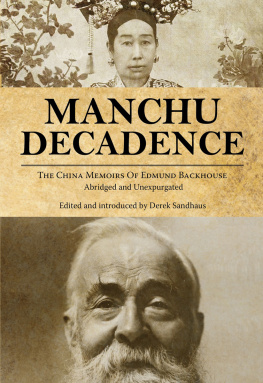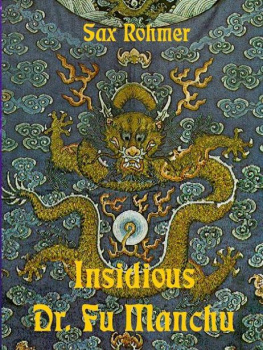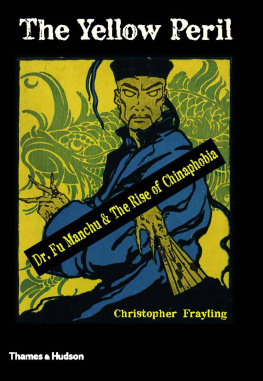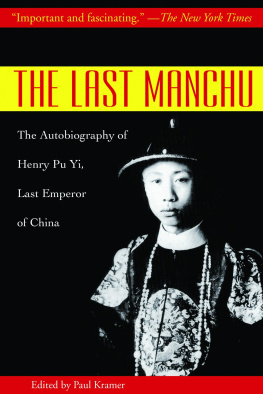First published 2004 by Berg Publishers
Published 2020 by Routledge
2 Park Square, Milton Park, Abingdon, Oxon OX14 4RN
605 Third Avenue, New York, NY 10017
Routledge is an imprint of the Taylor & Francis Group, an informa business
Sybille van der Sprenkel 2004
All rights reserved. No part of this book may be reprinted or reproduced or utilised in any form or by any electronic, mechanical, or other means, now known or hereafter invented, including photocopying and recording, or in any information storage or retrieval system, without permission in writing from the publishers.
Notice:
Product or corporate names may be trademarks or registered trademarks, and are used only for identification and explanation without intent to infringe.
ISBN 13: 978-1-8452-0002-2 (hbk)
Foreword
AS A STUDENT of Sociology I had been puzzled before going to China at the fact that westerners should ever have sought extra-territorial rights in a country whose civilization was in so many respects superior to our own.
My husband and I spent the years 1948 and 1949 in North China, where he was visiting Professor at Nankai University, Tientsin, under the auspices of the British Council. I was for a time lecturer in the Modern Languages Department at Nankai and later on the staff of the British Council Centre, Peking. Until the fighting actually reached Tientsin, we lived among our colleagues and students on the university campus, where at the time we were the only foreigners. In Peking after Liberation my work brought me into contact with teachers in schools, and with staff and students in the universities; I conducted English conversation classes through the summer and autumn of 1949 which were attended by Chinese office-workers, and with Chinese friends as guides I visited industrial co-operatives and craftsmens workshops.
From our students and colleagues at Nankai in 1948 we learned something of police methods, and once as a consequence we encountered a judge sent from Nanking (during the hyper-inflation) to try those suspected of communist sympathiesbut with insufficient funds to set up his court. Later our own contacts with officialdom multiplied, as permits were required for journeys outside the city, or to import books and on other occasions; and once our curiosity to see a temple fair, combined with the inefficiency of the permit-issuing office, resulted in our being held under arrest for six hours. We heard about the new Peoples Courts, but had no experience of them ourselves. Despite the fascination of events and their impact on the lives of our friends and on us, however, these years of upheaval and suspicion, at the climax of a civil war and the inauguration of a new regime, were no time for pursuing dispassionate social enquiry.
When I returned to England in 1950, I decided to make a study of the traditional Chinese legal system, and I eventually submitted a thesis on this as part of the requirement for a Masters degree in the University of London.
At the London School of Economics I received supervision and encouragement from Professor M. Ginsberg and Dr M. Freedman, and the stimulus of fellow-researchere in the Departments of Sociology and Anthropology, while I was able to continue my study of Chinese and learn some Japanese at the School of Oriental and African Studies.
I owe Otto van der Sprenkel a debt of gratitude, first for tolerant encouragement with a subject he thought an unwise choice, and since then for much help at various stages of the work. Among Sinologists from abroad, I should like to thank especially Professor Balazs, Professor Fairbank, Professor Hulsew and Professor van der Valk for the inspiration derived from their visits.
I am grateful to the Australian National University for the opportunity I have had in the Department of Far Eastern History of studying earlier developments, so as to make better sense of Ching institutions, and of revising, correcting and adding to the original study. Professor FitzGerald has kindly read the typescript.
The text translated in Wang Ling. Mr S. Yanada helped me with texts in Japanese.
I also wish to thank the Wenner-Gren Foundation for Anthropological Research for permission to quote from Dr Hu Hsien-chins monograph, The Common Descent Group in China and its Functions and the Geography Department of the London School of Economics for preparing the map and diagrams.
Mrs Ines de Rachewiltz of the School of Oriental Studies in the Australian National University has most kindly undertaken the work of typing the index of Chinese characters, the extra calligraphy required being done by Mrs Wu Huang Chieh.
Publication has been assisted by a grant from the funds administered by the Universities China Committee in London.
Finally, because of the distance between London and Canberra, this book must have involved Dr Stirling in more work than usually falls to the editor.
S. v.d. S.
Canberra,
November 1960
Preface to the 1966 Reprint
IT SEEMS that interest in legal and related institutions in China has grown rapidly since I began my researches, and in the time since I completed my manuscript a number of books and articles have appeared. I am glad of this opportunity to include these and make good a few earlier omissions in a supplementary bibliography.
As it is not possible in this edition to include revised references throughout the text, I should like to draw attention particularly to the additional material on administrative structure and judicial machinery contained in the authoritative books of Professor Hsiao Kung-chuan and Professor Ch Tung-tsu; to Professor Boddes scholarly assessment of the Chinese achievement in the field of law; and to the illuminating work of Professor Skinner, which offers a new perspective on the balance between various aspects of social structurerural-urban relations and the relative significance of official and spontaneous organisation in rural communities. The titles of the other works indicate the points at which they are relevant.
I think that it is true to say that the effect of recent studies is in the main to re-inforce rather than to invalidate one another. Except for a few matters of detail, I should wish to stand by what I wrote, so perhaps a revised edition may wait until it is possible to take account of other work now going on.
I should like to mention two more general books which have appeared since I wrote this. Perhaps others besides myself may be relieved to discover from Professor Hars











